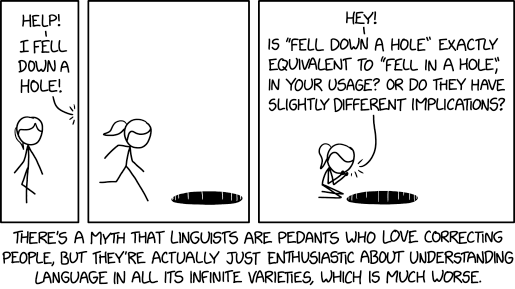this post was submitted on 04 Feb 2024
344 points (97.8% liked)
Linguistics Humor
1188 readers
18 users here now
Do you like languages and linguistics ? Here is for having fun about it
Share this community: [[email protected]](/c/[email protected])
Serious Linguistics community: [email protected]
Rules:
- 1- Stay on Topic
Not about Linguistics, language, ways of communications - 2- No Racism/Violence
- 3- No Public Shaming
Shaming someone that could be identifiable/recognizable - 4- Avoid spam and duplicates
founded 2 years ago
MODERATORS
you are viewing a single comment's thread
view the rest of the comments
view the rest of the comments

As a native English speaker, I had no idea going into this discussion, but that sounds like a pretty good explanation!
Now, is there a difference between falling down and falling into the hole?...
I would have guessed that into and in are interchangeable for this case, at least in US English. But in other contexts into is a direction, in is a position.
Falling into it includes the travel time (potentially from a great height), whereas in mostly pertains to the end state?
That would mean into and down refer to different parts of the falling timeline.
Instead of the travel time, I think that the matter here is the movement: "into" implies movement, so it can be only used when there's a change in position. And the interchangeability in this case is caused by the fact that, while "in" doesn't imply movement, it doesn't imply its lack either.
Other IE languages also show this sort of grammatical movement marking, although through different ways. For reference, in Latin:
English also used to have this distinction in the auxiliary verbs that you'd use with the past - "be" if there's movement (even metaphorical), "have" otherwise. You see this for example in Oppenheimer's translation of Bhagavad Gita, "I am become Death" (modern: "I have become Death"), but eventually this usage of "be" was completely replaced with "have". German still does it but... it's complicated since movement itself isn't the sole factor, the main verb also dictates the auxiliary to some degree: